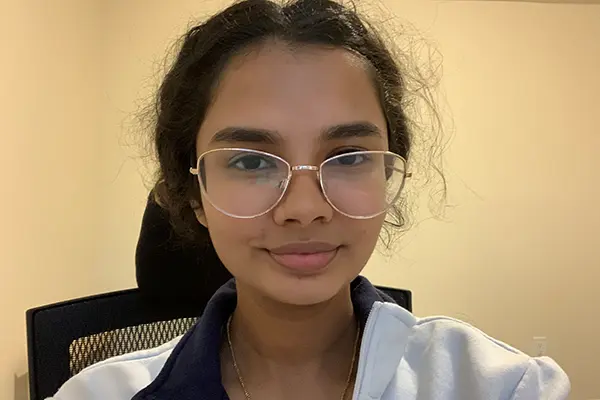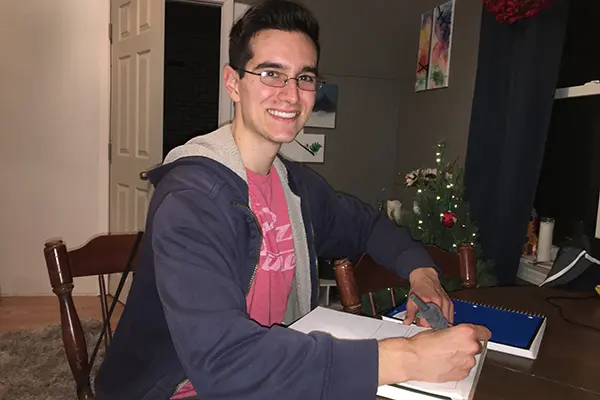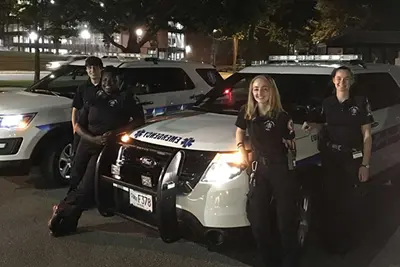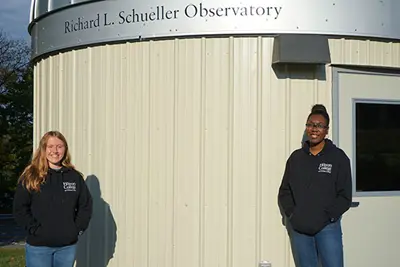Art Professor Says Graphic Stories Are Key Education Tools
 Image by Courtesy
Image by Courtesy
12/18/2020
By Katharine Webster
Gayathri Dayashankar, a psychology major who is pre-med, signed up for a new honors seminar last spring: Graphic Novels in Science and Medicine, taught by Karen Roehr, associate professor of art and design.
The class aligned with Dayashankar’s interest in medicine as well as her love of manga novels and comics, even though, she says modestly, “I can’t really draw.”
Then a first-year student, she greatly enjoyed the readings and the challenge of creating her own graphic stories. She even improved her drawing.
“During high school, I only took hardcore academic classes. This was so much fun; it was such a breath of fresh air,” Dayashankar says. “I really liked getting pushed out of that academic box that I’d closed myself into.”
That doesn’t mean the class is easy, though, she says. Students read, research and discuss both the story lines and the art in graphic novels on science and medicine, and then create their own.
For her final project, Dayashankar created a graphic novella about two women with differing incomes and health insurance coverage – and what happened to them and their families when they became seriously ill.
 Image by Courtesy
Image by Courtesy
“Writing this out, I had to do a lot of my own research, and that definitely deepened my understanding of health disparities,” she says. “The project definitely fired up my passion to do something about them.”
Roehr created the honors seminar after taking part in a conference on graphic medicine at the Center for Cartoon Studies in 2018. She is working on a graphic novel about a friendship between two teenagers with chronic illnesses, and spoke at a conference earlier this year about how graphic medicine can engage young adults in difficult topics.
In the seminar, Honors College students analyze story structure and complete assignments, such as retelling “The Three Little Pigs” from a scientific or medical perspective, and writing about something they fear, whether that’s COVID-19 or exposure to dangerous chemicals.
 Image by Courtesy
Image by Courtesy
Since the class is not aimed at art majors, Roehr says her main focus is on students’ ability to tell compelling stories, step by step. Such graphic stories are an important educational and public health tool, she says.
“My emphasis is helping students understand how tying words and images together is very powerful and helps people remember things,” she says. “Graphic novels and comics can be used not just to educate about the biology of an illness, but also to show how the illness affects families and communities. When someone writes something in this form, it offers a link to empathy.”
Roehr also teaches the visual language of comics, from choosing the size of a panel to portraying emotion and action.
Duc Vu, a chemistry major with a minor in education through the UTeach program, says he mostly drew stick figures when he took the course last spring, but he loved the storytelling aspect of the assignments, and – like Dayashankar – improved his drawing.
“The class was a lot of work, but it was also really enjoyable,” he says. “Prof. Roehr would give us little lessons in drawing in a way that tells a story: the vanishing point, composition, how to draw certain objects. We got a lot of practice drawing facial expressions in class.”
He says the class inspired him to start work on a graphic novel over the summer, in collaboration with an artist friend. He also thinks that the storytelling skills he learned will help him be a better teacher.
 Image by Emma Baerny
Image by Emma Baerny
Kyle Mehan, a senior nutritional science major, is also interested in how graphic stories can be used for education, especially health education. He’s seeing examples everywhere during the COVID-19 pandemic, he says.
“We had to practice communicating complex health topics through comics,” he says. “It made it feel way more accessible.”
This semester, Roehr assigned the students to do a “COVID comic,” based on their experiences during the pandemic. Many of the resulting stories spoke of the students’ stress as they studied online while isolated from friends, Mehan says.
“It didn’t have to have a happy ending, which kept it kind of real,” he says. “It gave us an opportunity to vent. It was good to organize my thoughts and how I felt about it – it was really kind of therapeutic.”
Mehan’s final project aims to introduce veganism to children and teens. A vegan himself, he wants to educate young people about the links between a diet heavy in animal products and chronic diseases.
“I’m trying to say, ‘Hey, you can eat plants and do something to actively prevent these problems. You actually have some weapons in your arsenal, and those weapons are in your fridge,’” he says. “My biggest challenge is trying not to come off as preachy.”




